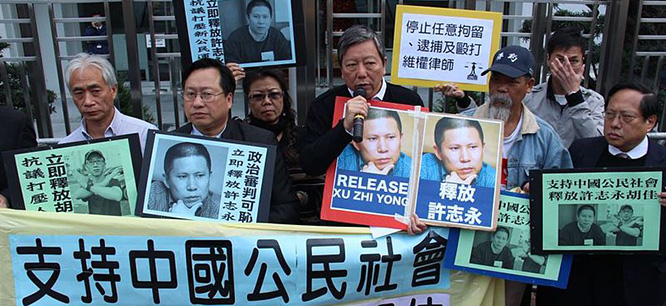At Dissent Magazine Nicholas Cavell reports on imprisoned lawyer and civil rights activist Xu Zhiyong’s “powerful” closing statement in court in which he emphasized his dedication to the goals of the New Citizens’ Movement, a civil society initiative which he formally established in 2012. Xu was arrested in August for allegedly organizing anti-corruption demonstrations, becoming one of the first of several dissidents to recently stand trial under Xi Jinping’s crackdown on civil society. His translated closing statement is excerpted here:
You have accused me of disrupting public order for my efforts to push for rights of equal access to education and for reforms allowing migrant workers’ children to sit for university entrance examinations where they reside, as well as for my calls that officials publicly declare their assets.
While on the face of it, this appears to be an issue of the boundary between a citizen’s right to free speech and public order, what this is, in fact, is the issue of whether or not you recognize a citizen’s constitutional rights.
On a still deeper level, this is actually an issue of fears you all carry within: fear of a public trial, fear of a citizen’s freedom to observe a trial, fear of my name appearing online, and fear of the free society nearly upon us.
[…] [While] you have not mentioned the New Citizens’ Movement throughout this trial, many of the documents presented here relate to it, and in my view there is no need to avoid the issue. . . . What the New Citizens’ Movement advocates is for each and every Chinese national to act and behave as a citizen, to accept our roles as citizens and masters of our country—not to act as feudal subjects, remain complacent, and accept mob rule or a position as an underclass. . . . [Source]
Also at Dissent Magazine, Jeffrey Wasserstrom chairs a roundtable “on law, reform and repression in China” with Fordham Law School’s Carl Minzner, lawyer Rebecca Liao, the Open Society Foundations’ Thomas Kellogg, and the UC Irvine School of Law’s Benjamin van Rooij. Liao describes Xu’s trial as “disappointing” and indicative of a step back for legal reform in China:
Alas, we found out this month that the party’s attempt to understand and implement legal best practices does not apply to all. The trials of Xu Zhiyong and fellow members of the New Citizens’ Movement he founded are a disappointing, befuddling step back for China’s legal reform program. These are the highest-profile legal proceedings since Bo’s trial, and contrasts between the two could not be starker. Xu’s trial was closed to the public and the media. There was no Weibo feed offering a window into the case. The defense was not able to call or cross-examine witnesses. Xu was summarily cut off midway through his statement to the court.
At first blush, it would appear that the party has every incentive to replicate the procedural safeguards and transparency of the Bo trial. An international and domestic audience is also watching Xu’s case and passing judgment on China’s legal system, the linchpin of Xi Jinping’s reform agenda. A major difference, however, between Xu’s and Bo’s cases is that the latter was a matter of political infighting. Though the stakes were high, all parties involved were known quantities to one another, compatriots and colleagues working, at the end of the day, to strengthen the Communist Party. A deal could be struck ahead of time. The party had no such luxury with Xu and therefore believed it had to circumvent legal procedure to retain control of the trial’s messaging. [Source]
Maya Wang at Human Rights Watch adds that the Chinese government “should think hard about the road they are taking” when choosing to crackdown on the New Citizens’ Movement:
The current crackdown is arguably one of the biggest and most concerted in the past twenty years. Ten activists who organize under the banner of Xu’s New Citizens Movement have gone on trial within months—and that is not counting the detentions and imprisonment of many others not even related to the New Citizens effort. At the same time, the government has systematically tightened other contentious spaces for public activism, putting new controls on the Internet, mass media and even universities. Pressure in Tibet and Xinjiang has also intensified, culminating with the arrest of Uyghur scholar Ilham Tohti in mid-January for the crime of “splittism.”
What makes this latest round of repression distressing is that the message of the rights defense movement and the New Citizens Movement in particular was modest, inclusive and constructive. Xu borrowed the language of the government on the rule of law and justice, and that should have made him less of a threat. The New Citizens Movement never organized opposition parties or explicitly pushed for multi-party democracy, which is the Communist Party’s greatest fear, but Xi Jinping and his new government seem unable to tolerate even moderate critics. [Source]
At Human Rights in China human rights lawyer Teng Biao discusses Xu Zhiyong, the New Citizens’ Movement, and the authorities’ reactions in a video interview:
Read more about Xu Zhiyong via CDT.







